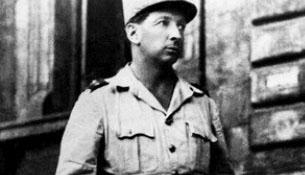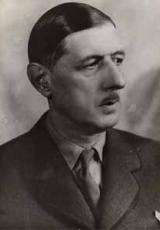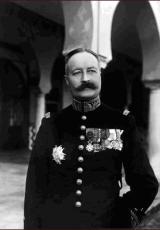Diégo, Charles Brosset

(3rd October 1898: Buenos-Aires, Argentina - 20th November 1944: Champagney, Haute-Saône)
Born in Buenos Aires, Argentina, into a family of magistrates from Lyon, Diego Brosset returned to France at the age of two and grew up in the château at Rillieux-la-Pape. Unable to support the confinement of the Jesuit colleges he attended, he finished his studies at the age of fifteen to return to the family home. During the First World War, on the 17th September 1916, he enlisted as a second class soldier in Grenoble with the 28th battalion of foot chasseurs and later in the 68th. In four tours of duty, he was awarded many commendations and was promoted to corporal and later sergeant. A distinguished serviceman, he attended the officer training school at Issoudun and passed the entrance examination for the Saint-Maixent Military infantry academy, which he left in 1921 as a second lieutenant. He chose the colonial infantry and was posted to French West Africa to the 2nd regiment of Sudanese infantrymen. Appointed to a platoon of méharistes (camel mounted cavalry) in March 1922, he spent around fifteen years patrolling in the Sudan (Kati), Mauritania (Chinguetti, Atar and Agaraktem), Southern Algeria (Touat Gourara and Tindouf) and Southern Morocco (Lekdim), interspersed with brief, reluctant returns to France.
With a passion for literature, he made the most of his free time to complete a semi-autobiographical novel, "Il sera beaucoup pardonné", for the publication of which he requested the patronage of François Mauriac. In February 1928, promoted to the order of Cavalier of the Legion of Honour, he was posted to the 23rd colonial infantry regiment at Coulommiers. At the Châlons camp, he met Jean Bruller (alias Vercors), starting a long literary friendship between the two men. Promoted to captain in 1930, he returned to France and in August 1931 he married Jacqueline, the daughter of General Mangin. He returned to Morocco in 1933 for four years, during which time he fought alongside General Giraud at the head of the 29th Goums. A tireless writer, he competed several times, unsuccessfully, for the grand prix for Colonial literature. He overcame his disappointments by studying for the entrance examination for the Ecole supérieure de Guerre, where he was admitted in January 1937, having obtained a degree in oriental languages. Awarded the 59th Promotion in August 1939, he was appointed to the general staff of the colonies.
On the 3rd September, diplomacy gave way to canons. Brosset rejoined his unit on the Lorraine front. In December he accepted a position at the 2nd bureau of the colonial army corps, received his commander's stripes and then applied to take part in a military expedition to Columbia. His application was successful and the Brossets arrived in Bogota in May 1940. News of the armistice reached South America on the 23rd June. As a man of action, Diégo could not come to terms with it. On the 27th June he sent a letter to General de Gaulle expressing his complete support and became an "ambassador" for the Free French (France Libre) in his writing, through his expedition to Columbia, which was soon to be cancelled. Brosset refused to carry out the orders of the Vichy government, which sentenced him to death in his absence, informing his superiors of his decision to take orders from General de Gaulle. On the 8th December, he was finally able to obtain support from London, where he was promoted to Lieutenant-colonel at the 2nd bureau before taking part in the General's colonial expedition in his capacity of staff officer: in Freetown, Brazzaville, Fort-Lamy, Cairo and Eritrea where he was for a time Chief of Staff to General Catroux: the Horn of Africa then became an important strategic issue with the arrival of the Afrika Korps in the Tripoli area. From June 1941 until December 1942, he was involved in the fratricidal struggle between General Legentilhomme's France Libre troops and those of General Dentz in Syria, who remained loyal to Pétain, a situation which would only be resolved by the armistice of Saint-Jean d'Acre. His long experience of the desert earned him his mission in the East of Syria before a new posting in January 1943 to the 2nd brigade at Marsa Matrouh in Cyrenaica. Brosset reorganised his unit, driving it across the Libyan desert to Gambut (Tobrouk) and leading it, between the 9th and 11th May, to the victory of Takrouna by pushing enemy lines back three kilometres. Appointed Brigade General on the 1st June, he received the Liberation Cross directly from General de Gaulle and then took command of the 1st division of the Free French (the division française libre or DFL) in August, renamed the "motorised infantry division" ("division motorisée d'infanterie" or DMI). He rearmed and reorganised his company of troops with all his characteristic energy. On the 11th April 1944 the retaking of Europe could finally begin: leaving from Bône and Bizerte, his men arrived in Italy. Brosset took part in rupturing the Gustav, Dora and Hitler lines at the battle of Garigliano, marched on Rome and, at the end of June, liberated Tuscany, before opening a new front in the south of France alongside General de Lattre de Tassigny. He landed with his division in Provence on the 16th August 1944, taking back Toulon, capturing Mont Redon and Hyères (20-21st August), Le Touar and La Garde (22-23rd August) and fighting in the countryside around Lyon. Still involved in the action, the newly promoted Division General marched at the head of the 1st DFL-DMI at the battle of the Vosges (20th September - 19th November 1944). The push to the Rhine could begin. On Monday, November 20th the attack on Giromany was launched. General Diégo Brosset, left at dawn for the front. He pressed on with his ordinance, taking unsecured routes. He visited a few camps, jumping from jeep to jeep. In this way he approached the bridge at Rahin (Champagney, Haute-Saône). He set off across it and his vehicle overturned into the river... His body, recovered on the 23rd November, would be buried in the national necropolis in Rougemont (Doubs). " In him France lost a shining power who was, only wanted to be and only ever was of service to her" (General Koenig).
Related articles
- Aux origines de la France Libre
- Who were the Free French?
- The 1st Free French Division (DFL)
- The RICM, the most decorated regiment of the French army
- La campagne d'Italie (3 septembre 1943-2 mai 1945)
- Les Français dans la campagne d'Italie (1943-1944)
- Operation Anvil-Dragoon in detail
- Provence août 1944
- L'année 1944




